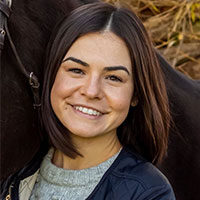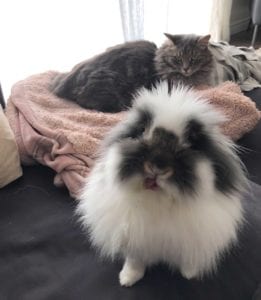
Alexandra Rankovic
Title
Ph.D. Candidate, at Ontario Veterinary College, University of Guelph
Alexandra Rankovic will speak on the potential benefits of supplementing dietary choline to cats on Friday, September 24, at 9:30-10:15 a.m. during the panel session on “Cats are unique creatures: New nutrition research.” Register here
Learn more about Alexandra’s presentation below:
What is your focus in your Ph.D. program?
Alexandra: My research investigates whether supplementing additional dietary choline to overweight and obese cats can promote the utilization of fat, with a special focus on the liver.
Periods of drastic energy restriction can predispose overweight and obese cats to developing fatty liver. We hope that knowledge gained from this research may provide a novel nutritional approach to safe and effective weight loss in overweight and obese cats, and the prevention of fatty liver.
How has cat nutrition changed?
Alexandra: Traditionally much of the product innovation within the industry has been focused on dogs. However, cats aren’t small dogs. They have a unique set of needs and nutritional requirements, which are increasingly being met with the development of innovative functional formulas aimed at improving feline health and wellness. As the cat population continues to grow, we must be committed to further understanding their idiosyncrasies and how we can meet them.
Most owners are strongly bonded to their cats, which is now even more apparent as a result of the pandemic. I believe that product innovation launches and humanization have and will continue to increase in the cat food sector.
What next steps would you like to see in cat food development?
Alexandra: I’m very excited about the increasing number of diets formulated with insect protein! I think the focus on sustainability and sustainable ingredients such as this are a great step forward, and one that I hope continues.
Additionally, obesity continues to affect the majority of cats in North America and has many negative health consequences for our feline friends. I hope we can continue to apply the latest research findings, as they develop, to formulate diets that can help prevent weight gain and assist with weight loss in cats.
What pets rule the Rankovic household?
 Alexandra: We share our home with our cat Larry and our bunny Oscar. Oscar is “free-roam” and is definitely in charge of everyone in the house, including Larry!
Alexandra: We share our home with our cat Larry and our bunny Oscar. Oscar is “free-roam” and is definitely in charge of everyone in the house, including Larry!
Panel discussion:
Cats are unique creatures: New nutrition research — Though a smaller part of the overall pet food market, cat food represents a growth segment globally, as more pet-loving consumers turn to cats as companions. Product development is starting to catch up, emphasizing that cats are not small dogs; they have their own unique nutritional and health needs. What does the latest research show? Topics and experts include:
- Long-term effects of diet format on body weight, body composition and insulin sensitivity in the cat — Emma Bermingham, Ph.D., AgResearch
- Holistic approach to measuring palatability in wet cat diets — Susan Jojola, Ph.D., and Punyatoya Mohapatra, Ph.D., AFB International
- Potential benefits of supplementing dietary choline to cats — Alexandra Rankovic, University of Guelph
Experience:
Alexandra Rankovic is a doctoral candidate from the Ontario Veterinary College at the University of Guelph. Her doctoral research focuses on the lipotropic effects of dietary choline supplementation in overweight and obese cats. She previously obtained her master’s degree in companion animal nutrition, where her research focused on the glycemic index and the effects of carbohydrates on health in dogs. Rankovic has presented her research at a large number of international conferences and has contributed to numerous peer-reviewed publications. She has experience working with several pet food companies, including Royal Canin Canada and Petcurean Pet Nutrition.

